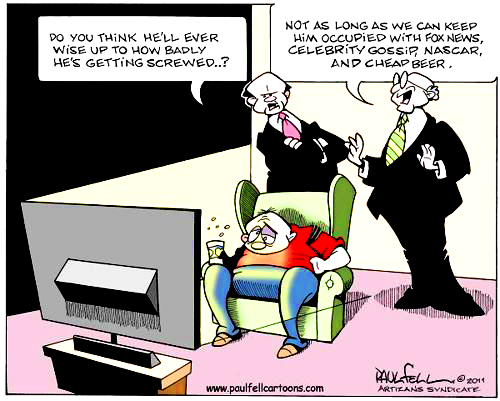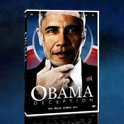welcome
|
||
Big Brother/Sis And Surveillance Systems
There are over 30 million closed-circuit television cameras in America recording 24-7, catching the average citizen on film nearly 200 times daily. Every American has a 9-digit government Social Security number assigned to them at birth. We require government licenses to drive, to get married, and have pets, government passports to travel, and corporate credit cards to book tickets, make reservations, and shop online. Our phone lines are tapped and our emails are compiled and saved. Intelligence agencies and corporations share and maintain huge databases full of information on every citizen. The government, corporate, and media interests have all melded into one cohesive unit, propagating the “official” version of reality through every newspaper and TV set.
‘Smart’ Street Lights to “Track
Everything We Do All the Time”
by Paul Joseph Watson | July 1, 2014
The lights are being marketed as a fantastic energy saving device because they have motion sensors which detect foot traffic, allowing them to switch on and off only when required. A CBS News report showcases the smart lights in action at Newark Airport and at an underground parking lot, while imagining that all 4 billion outside street lights may eventually all be “connected in one global network.” A “seamless grid” of smart lights networked with surveillance cameras also provides security for a parking lot outside a Silicon Valley building, tracking an individual’s “every move” while also utilizing license plate recognition technology to store data about vehicles. “The future is limitless for this technology,” asserts Shorenstein Engineering manager Kevin Kirk. “In the future, the smart network could track every place we go, everything we buy, everything we do all the time,” states reporter Bill Whitaker. Responding to the charge that such a scenario “sounds Orwellian,” Hugh Martin, Chairman and CEO of Sensity Systems, cited the necessity to protect schools by using the smart system to detect guns, while denying that the technology was racing ahead of policy makers’ ability to control its reach. What the CBS report failed to mention is that some of the “high-tech add ons” being included in smart street lights include technology that can record conversations. Last year we reported on how Illuminating Concepts, the company behind Intellistreets, bragged on their website that their smart LED system, which is being rolled out in major cities like Las Vegas, has the capability of analyzing voices and tracking people, features that will aid the Department of Homeland Security in “protecting its citizens.” A page on the Intellistreets website (since removed) which highlighted “benefits and applications” featured a section on security admitting that the hi-tech system includes “voice stress analyzers,” amongst several other sophisticated sensors that “assist DHS in protecting its citizens and natural resources.” Authorities in New York City announced last year that they would be replacing the city’s 250,000 street lights with new LEDs by 2017, although it is not known how many of these will feature “smart” technology. While the CBS report raises a few token privacy questions, the tone of the piece is undoubtedly positive, touting the brightness, longevity, security and environmental benefits of the new street lights. At the end of the report, one of the studio anchors alongside Charlie Rose glibly exclaims, “Big Brother is watching,” as if it’s a good thing.
Facebook @ https://www.facebook.com/paul.j.watson.71 ********************* Paul Joseph Watson is the editor at large of Infowars.com and Prison Planet.com.
Louisiana Creates Database of Citizens Who Represent “A Risk to the State” Information hub would detect potential future criminals and allow government to “intervene”
Paul Joseph Watson Authorities in Louisiana are compiling a database of information on every citizen in order to identify people who are “a risk to the state,” as well as pinpointing future criminals in an effort to allow the state to “intervene in that person’s life”. Details of the program were recently divulged by Chris Broadwater, Republican member of the Louisiana House of Representatives from District 86, in a YouTube video which can be viewed above. The Comprehensive Person Profile, developed by software company SAS, uses information from every agency of state government to compile personal data entries on Louisiana residents which are centralized on one database. Originally set up to combat fraudulent workers’ compensation and unemployment insurance claims, the program was expanded to create a “centralized data warehouse” that allows “every agency within state government” to both submit and access data on every person within the state. The purposes of the database, in the words of Broadwater, are to “detect fraud” and to identify people who are “a risk to the state down the road based upon the information we know about the individual,” enabling authorities to quickly identify “an individual who is going to be at risk of incarceration down the road,” a process that sounds an awful lot like ‘pre-crime’. Broadwater remarks that the state having such a treasure trove of information about each individual will allow authorities to “intervene in that person’s life”. The program is also being introduced under the guise of making the lives of Louisiana residents “better” by way of things like speeding up the process of renewing a drivers license. Broadwater notes that during this process, state workers would be able to access information about the applicant’s children and make recommendations about health insurance. Very little information about how the state of Louisiana is actually using the program is in the public domain besides what Broadwater reveals in the video above. Activist outfit The People, LLC is calling on citizens of Louisiana to support Rep. Schroder’s HB 1076 (data privacy) bill, which would go some way to nullifying that information that could be shared with the state database. ********************* Paul Joseph Watson is the editor and writer for Infowars.com and Prison Planet.com. He is the author of Order Out Of Chaos. Watson is also a host for Infowars Nightly News.
Your Phone Is Gathering Intelligence For The NSA
A new app, Humin, lets you and your smart phone act as Humint (human intelligence) for the surveillance state. Don't worry, it'll be called a "digital butler". But you don't have to wait, you can sign up with Verizon right now and be rewarded for being tracked and sold. http://online.wsj.com/articles/meet-y... http://www.infowars.com/verizon-offer...
DARPA to Track “All Human Activities That Can be Measured”
Samsung ‘Smart TV’ Records “Personal” Conversations &
Sends Them to Third Parties
by Paul Joseph Watson | November 3, 2014
Samsung’s new global privacy policy for its line of Smart TVs states that a user’s personal conversations will be recorded by the device’s microphone and transmitted to third parties. A 46-page privacy policy which is now included in all newly purchased Samsung Smart TVs states that voice recognition technology “may capture voice commands and associated texts” in order to “improve the features” of the system. The policy, a summary of which is also posted online, ominously advises users to, “Please be aware that if your spoken words include personal or other sensitive information, that information will be among the data captured and transmitted to a third party through your use of Voice Recognition.” Writing about the privacy policy for Salon.com, Michael Price, counsel in the Liberty and National Security Program at the Brennan Center for Justice at NYU School of Law, said he was now “terrified” of his new TV, noting that voice recognition is just one feature that could be used to spy on users. The television also logs website visits, has a built-in camera for facial recognition and uses tracking cookies to detect “when you have viewed particular content or a particular email message.” “I do not doubt that this data is important to providing customized content and convenience, but it is also incredibly personal, constitutionally protected information that should not be for sale to advertisers and should require a warrant for law enforcement to access,” writes Price, adding that current privacy laws offer little protection against “third party” data. Price also draws attention to comments made in 2012 by former CIA director David Petraeus, who hailed the “Internet of things” as a transformational boon for “clandestine tradecraft”. In other words, it will soon be easier than ever before to keep tabs on the population since everything they use will be connected to the web, with total disregard for privacy considerations. The spooks won’t have to plant a bug in your home or your vehicle, you will be doing it for them.
Secret Features Hidden in Your Smart TV by Infowars.com | November 8, 2014 Infowars reporter LeeAnn McAdoo reveals the privacy-infringing features hidden inside Samsung’s new “Smart TV.”
As we have documented, the Internet of things is the process of manufacturing every new product with a system that broadcasts wirelessly via the world wide web, allowing industry and the government to spy ubiquitously on every aspect of your existence. In recording private conversations for potential third party use, Samsung is merely mimicking what games console makers have done for years. Since its launch in 2010, Microsoft’s X-Box Kinect games device has a video camera and a microphone that records speech. The company informs its users that they “should not expect any level of privacy concerning your use of the live communication features,” while Microsoft also “may access or disclose information about you, including the content of your communications.” Last year, Microsoft was forced to deny claims that the Xbox One’s Kinect camera could see gamers’ genitals after video footage emerged which suggested the device’s IR camera was so sophisticated that it could capture the outline of a user’s penis. Gamers also complained that Kinect was monitoring their Skype conversations for swearing and then punishing them with account bans. With Christmas fast approaching, millions more people will splash the cash on games consoles and smart TVs completely oblivious to the fact that they are paying to have their private conversations recorded and potentially transmitted to third parties. Facebook @ https://www.facebook.com/paul.j.watson.71 ********************* Paul Joseph Watson is the editor at large of Infowars.com and Prison Planet.com.
New Amazon Device Uses Voice Recognition to Track Users in
Their Homes
by Mikael Thalen | Infowars.com | November 7, 2014
Amazon unveiled its new digital assistant the “Echo” this week, a cloud-connected device that is “always on.”Controlled by a user’s voice, Amazon boasts the device’s ability to answer questions, provide weather updates, and play music. “Amazon Echo is designed around your voice. It’s always on—just ask for information, music, news, weather, and more,” Amazon states. “Echo begins working as soon as it hears you say the wake word, ‘Alexa.’ It’s also an expertly-tuned speaker that can fill any room with immersive sound.” Using “far-field voice recognition,” the Echo can detect and analyze voices even when other loud noises are prevalent. “Tucked under Echo’s light ring is an array of seven microphones. These sensors use beam-forming technology to hear you from any direction. With enhanced noise cancellation, Echo can hear you ask a question even while it’s playing music.” Echo’s constant connection to the cloud allows it to learn and adapt, slowly gathering the specifics of a user’s characteristics. “Echo’s brain is in the cloud, running on Amazon Web Services so it continually learns and adds more functionality over time. The more you use Echo, the more it adapts to your speech patterns, vocabulary, and personal preferences.” While the Echo is always activated, Amazon assures its customers that “Alexa” will only listen when a user asks. Given Amazon’s history of selling privacy-invading devices, such as the company’s “Fire Phone,” the safety of any collected personal information is in question, especially in light of recent news surrounding cloud security. Unfortunately, the push towards cloud computing and “smart” tech has long ignored these important social and security implications. During a 2012 speech, former CIA Director David Petraeus openly applauded the growing implementation of such technology due to its ability to give spy agencies unmitigated access to personal information. “Transformational is an overused word, but I do believe it properly applies to these technologies, particularly to their effect on clandestine tradecraft,” Petraeus said. “Items of interest will be located, identified, monitored, and remotely controlled through technologies such as radio-frequency identification, sensor networks, tiny embedded servers, and energy harvesters — all connected to the next-generation internet using abundant, low-cost, and high-power computing.” Earlier this month, Samsung announced the launch of its new line of “Smart TVs,” which will admittedly record a user’s personal conversations before transmitting them to third parties. “Please be aware that if your spoken words include personal or other sensitive information, that information will be among the data captured and transmitted to a third party through your use of Voice Recognition,” the product’s privacy policy states. Even the most mundane of home appliances, including dishwashers, ovens , light bulbs and refrigerators, are now being equipped with WiFi and voice recognition capabilities, giving hackers, governments and corporations virtually unfettered access to every detail of a person’s life. Given Amazon’s close relationship with both the NSA and CIA, the company will be hard pressed to convince civil liberties advocates of Echo’s caring nature, whether programmed or learned. Facebook @ https://www.facebook.com/mt.examiner
Cops Can See Through Your Walls! Published on Jan 21, 2015 The radars work like finely tuned motion detectors, using radio waves to zero in on movements as slight as human breathing from a distance of more than 50 feet. They can detect whether anyone is inside of a house, where they are and whether they are moving. http://www.usatoday.com/story/news/20... NEW ‘TERAHERTZ’ SCANNER LETS MOBILE PHONES SEE THROUGH WALLS — AND THROUGH CLOTHES - http://www.infowars.com/new-terahertz... NEW POLICE RADARS CAN ‘SEE’ INSIDE HOMES - http://www.infowars.com/new-police-ra... SUPERMAN GOES BAD, JOINS THE NSA - http://www.infowars.com/superman-goes... NEW XBOX CAN SEE THROUGH YOUR CLOTHES LIKE TSA SCANNERS - http://www.infowars.com/new-xbox-to-p...
InfoWars Anchor Wears Tin Foil Hat! Published on Jan 23, 2015 Samsung’s new global privacy policy for its line of Smart TVs states that a user’s personal conversations will be recorded by the device’s microphone and transmitted to third parties. Plus NBC News talks about RFID Chips implanted under the skin by 2017. SAMSUNG ‘SMART TV’ RECORDS “PERSONAL” CONVERSATIONS & SENDS THEM TO THIRD PARTIES - http://www.infowars.com/samsung-smart... SAMSUNG RESPONDS TO PRIVACY CONCERNS OVER TVS RECORDING “PERSONAL” CONVERSATIONS - http://www.infowars.com/samsung-respo... SAMSUNG TVS CAN BE HACKED TO SPY ON VIEWERS - http://www.infowars.com/samsung-tvs-c... SECRET FEATURES HIDDEN IN YOUR SMART TV - http://www.infowars.com/secret-featur... SMARTPHONE APPS NOW USE MICROPHONE TO RECORD YOUR CONVERSATIONS - http://www.infowars.com/smartphone-ap... MAINSTREAM MEDIA FINALLY ADMITS TELEVISIONS CAN SPY ON YOU - http://www.infowars.com/mainstream-me...
Scotland Yard: Put CCTV's In UK Homes To Catch Burglars Published on Mar 10, 2015 Homeowners should consider fitting CCTV to trap burglars, the country’s most senior police officer declared yesterday. http://www.infowars.com/put-cctv-in-e...
This Simple Act Brought Down the Berlin Wall 25 Years Ago,What Will Bring Down The U.S. Stasi?
Published on Nov 11, 2014 As the 25th anniversary of the fall of the Berlin wall was celebrated, who and what brought it down? It was a symbol of the panopticon surveillance that East Germany created and maintained with its secret police - the Stasi. Today the American government, with the aid of technology, surpasses the Stasi in its reach into our lives. The latest example of lawlessness and arrogance is the FBI’s biometric database and the FBI’s insistence that we have no right to know anything about it or restrict it in any way. Berlin Wall: Thousands of balloons released to mark fall - http://www.bbc.com/news/world-europe-... The Man Who Disobeyed His Boss And Opened The Berlin Wall - http://www.bbc.co.uk/religion/0/24661333 Did a prayer meeting really bring down the Berlin Wall and end the Cold War? - http://www.npr.org/blogs/parallels/20... FEDERAL JUDGE SAYS PUBLIC HAS RIGHT TO KNOW ABOUT FBI’S FACIAL RECOGNITION DATABASE - http://www.infowars.com/federal-judge...
MORE SOLUTIONS HERE : Fighting Back Against Big Brother
-- Harriet Tubman --
"I freed a thousand slaves; I could have freed a thousand more, if only they knew they were slaves."
Only the vigilant can maintain their liberties, and only those who are constantly and intelligently on the spot can hope to govern themselves effectively by democratic procedures. "A society, most of whose members spend a great part of their time,
not on the spot, not here and now and in their calculable future, but somewhere else, in the irrelevant other
worlds of sport and soap opera, of mythology and metaphysical fantasy, will find it hard to resist the
encroachments of those who would manipulate and control it.” - Aldous Huxley - LINK :
TOTAL SURVEILLANCE SOCIETY LINK : Transhumanism And The Technocratic Era
REACH OUT TO OTHERS [Help Educate Family And Friends With This Page And The Links Below]
MORE: Big Brother/Sis & Surveillance Systems The NSA (National Security Agency) Mobile Van Radiating the Public India Biometrics 1.2 Billion People Communications Takeover by EAS Cell Phones Are Tracking Devices 10 Reasons Why Nothing You Do On The Internet Will EVER Be Private Again Facedeals scans your face to customize deals RFID chip Mandatory at Schools
| ||

























